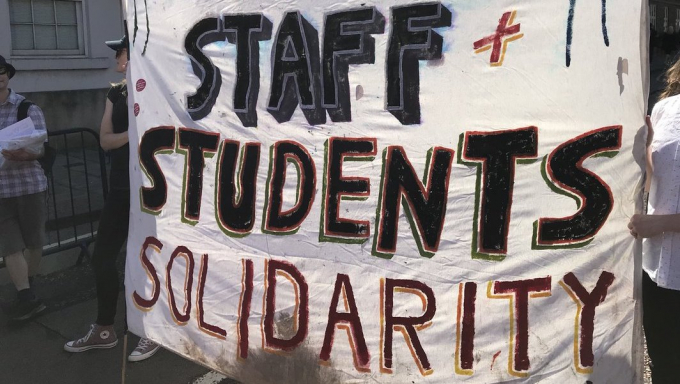
Guest post by GUCU members ‘Feminists Uncut’
In her recent letter to staff, ‘Addressing a Time of Change at Goldsmiths’, Warden Professor Frances Corner urges us not to vote in favour of industrial action by invoking our sense of responsibility towards students.
Her call to colleagues to avoid action is made, she claims, “in the interests” of students. She reproaches us that our students “deserve a dose of normality” and not “further disruption”. She says we need to put our “students first” and “we must balance our rights as staff with the needs of our students.” The clear implication (and intimation) of this call to our sense of responsibility is that if we do undertake industrial action, we are being not only irresponsible, but also selfish, putting ourselves instead of our students first.
If Frances Corner invokes responsibility and students’ interests it is not because those interests are particularly dear to her (or else she would have addressed this), but because she knows all too well that those interests are very dear to us. As educators and professional services staff, we see students as real people with individual stories, struggles and achievements, and not as numbers to fill in assessment forms, or as cash cows to fund large managerial salaries and not-so-independent business reviews..
Her call for responsibility towards our students is powerful psychological blackmail with echoes of paternalism that is at odds with the Warden’s feminist self-identification. It aims to mobilise our emotional commitments to radical and careful pedagogy and sense of duty towards our students in the short term.
To those colleagues who feel compelled to respond to the Warden’s call for responsibility and sacrifice, we ask you to consider not only the disingenuous nature of this call, but also the fearlessness of fellow workers who have undertaken industrial action when the very well-being and lives of others depend on their work.
In the last few months carers and nurses have gone on strike or threatened industrial action to claim their dignity as workers, to defend their jobs and demand wage increases and better working conditions. Given the ‘vital role’ these frontline essential workers play in so many people’s lives, are they being selfish when they go on, or threaten to undertake, strike action to better their working lives? Are they abdicating their sense of responsibility towards their patients or dependents when they withdraw their labour to force change on an employer that devalues and exploits them?
Most colleagues will probably answer: ‘No, these workers have been forced to do it in order to make their voices heard, to improve their working conditions and, in so doing, improve the very nature of the service they deliver.’ It is well known that the quality of care deteriorates when those who deliver it are unhappy and exhausted because of their poor wages and long hours. These workers know that they are doing their patients no favours by allowing poor and deteriorating conditions to continue.When essential workers undertake industrial action to better their working lives they are not just fighting for their own jobs and service, but for their practices of care and the sector as a whole: they are not being selfish or irresponsible, they are using their front-line knowledge of ‘what works’ to delivery the best care they can. And their pay is deducted for this withdrawal of labour.
The lives of our students may not depend on our lectures, but the prospects of many of our students hinge on an alternative idea of higher education, one that is not determined by a market-like logic. This is what we are fighting for. The vision and determination of these essential workers sets an example for us all: when our jobs are under threat, when our working conditions become unbearable, when our work sectors are being destroyed by the neoliberal myopia of incompetent managers, the responsible thing to do is to undertake strike action.
Some colleagues might still think that there are alternatives to strike action and the withdrawal of our labour, but the recent history of industrial relations, including within universities, proves this wrong. Not only that, but it is well documented that many different groups across College (Professors’ Forum, Collective Change, GUCU) have spent the last 18 months (at least) offering many actionable alternatives to the Warden and her SMT only to be stonewalled. The Warden is not interested in alternatives and therefore, also leaves us no further options.
There is a simple reason Frances Corner takes the ‘unprecedented’ step of urging us not to vote for strike action. It is because she knows very well that we are the only reason students enrol in universities in the first place. They pay their fees to listen to our lectures, to be taught by us and to develop their thinking and practice with us, maybe even occasionally be inspired by us, and to be helped and supported by the professional staff who deal with their needs and make the work of academics’ possible. To respond to the Warden’s call by not voting for strike action is to endorse and support a marketised vision of education that ‘deletes’ our labour rights. We cannot subscribe to such a vision.
In the face of these brutal cuts at Goldsmiths that will leave our students with less professional support, less contact time with academic staff, and a drastically narrowed curriculum, the visionary, radical and altruistic thing to do is to fight; and to fight hard. In the face of unprecedented attacks by our senior management, who act as the handmaidens of a right wing government agenda, we are the last custodians of higher education. We need to protect arts and humanities teaching not only for our current students, but for their younger siblings and the next generation.